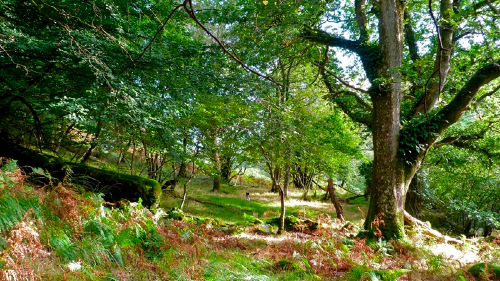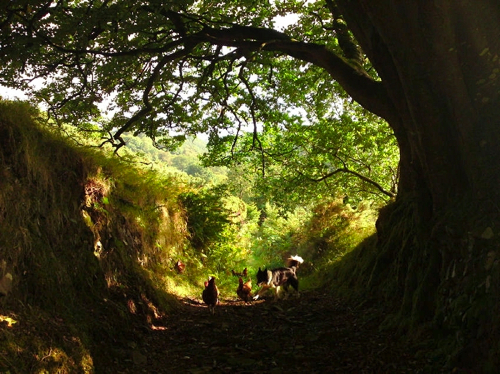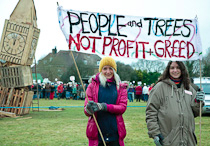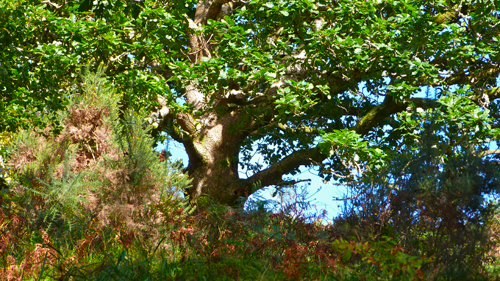We have to go back to basics, despite accelerated progress towards sustainability through discussion in the previous 20 years, it is now obvious through governmental policy decision making that we are actually no further forward in terms of real sustainability. Very few people seem to understand the basics and of those that do, they are so divided from mainstream thinking as to render their opinion useless.
First of all we need to get everybody thinking about soil.
Soil is the central hub for sustainability as essential to us and our economic progress as it is to the plants and animals we share our landscape with.
Soil is largely ignored; professional knowledge of soils is poor, public knowledge of soils non existent. Policy makers and even those purporting to campaign for the natural environment regularly ignore the attributes of soil; probably due to the lack of consciousness about it. We also see the media constantly getting the facts wrong about soils and perpetuating practice that is bad for soils in the belief that it is good.
A massive flow of money, charitable and governmental during the last 20 years has disappeared into designated landscapes and areas of rich biodiversity, far from the majority of the population. The government stance in line with that of many of the wider population is that we got what we paid for and in times of austerity any further campaigning for financing these pockets of land is done for selfish reasons.
These protected landscapes are no longer valid in terms of international ideals resulting from academic research and on the ground discoveries by practitioners and with the disenfranchisement of all involved except the Quango and NGO staff (evident simply by looking at the below average salaries for land based industry practitioners against the wealth of the land based NGOs) the landscape as a whole has been further fragmented by those trying to reverse such incidence.
In terms of landscape and biodiversity, the ‘expert led’ approach has clearly failed and communication between academic research and the practitioners is now simply non existent, let alone to the general public. All the feeble attempts at providing a knowledge bridge through government financed schemes have largely failed also. As such a less sexy issue such as soils was never stood a chance of being relayed to the population as a whole.
The one specific soils NGO – The Soil Association have persistently researched and campaigned for soils but have had to constantly face the wall of the disgraceful media, whose stance with regards all environmental or landscape issues is based on the strongest PR voice amongst the army of NGOs and then treated to debate. ‘Organics’ is dealt with in the same vein as ‘climate change’ – a debatable subject, even by the most serious of radio, TV or newspaper journalists. Organics is not about quality or taste, but about preserving our most vital of assets in realising sustainable goals; soil.
In the noisy debate surrounding the NPPF it is easy to forget, if ever realised, that the UK had an enviable reputation with regards the issue of ‘soil sealing’. Urban sprawl had been kept to a minimum in the UK, better than our neighbours in Europe, North America and Australasia. It was and still is a necessity in the UK that after having been allocated unfavourable sites; Architects, Planners, Engineers and Practitioners had to invent solutions to ease flooding and other environmental issues and thus prevented widespread soil sealing, (remediation of post industrial sites was another issue that the UK led the world in, for the same reasons). This group of professionals cannot shout as loud as the environmentalists, but we have to accept the fact that it will be this group who find the solutions to economic progression at no cost to the environment – not the environmentalists and the NGOs they work for.
The government do listen to the NGOs as well as those lobbying for their own policies, and thus end up searching for a middle ground that already exists. The result as with the ‘independent forestry panel’ is a weighted investigation, which cannot avoid being in favour of those who are responsible, albeit unwittingly, for the problems we now face in actually realising implementation of sustainable action.
For example are some facts which have been rarely mentioned by the NGOs, in favour of more profitable campaigns:
The majority of people remain ignorant that soils are the largest carbon store in the UK and that preserving our green spaces, urban playgrounds as well as remote moorland is vital in climate change mitigation.
There is an acceptance of biodiversity offsetting, which is blatantly impossible due to the simple fact that we cannot displace biodiversity without soils and soils cannot be displaced. It is far too cynical to suggest that biodiversity offsetting was potentially rewarding to some NGOs, but one wonders.
The National Trust stepping out of a cosy box to fight for all landscapes, everyday places, is a huge and highly significant development for the future of land industry as a whole. It has helped to expose the mindsets that see nothing wrong with going on record in stating their opinions which highlight how far from sustainable the UK actually was, for example; one property lawyer this week stated that the Brundtland definition of sustainable was an impossible concept. If problems are not visible we can never hope to fix them. And the huge divides in English society with regards our natural environment, sustainability and landscapes have never been so visible.
Combine the concept of landscapes belonging to all with a new drive to rediscover the importance of our soils and we can start to find a way out of the mist that had prevented actual mainstream progression towards sustainability. Add the voice of the aforementioned group, those that had actually already discovered on-the-ground methods, and new optimism can be gained.
The NPPF and Forest Sell Off may well yet prove to be the catalyst that enables England to actually jump further forward in terms of true sustainability than at any previous time in history. But without public and practitioners included it will be impossible.


























